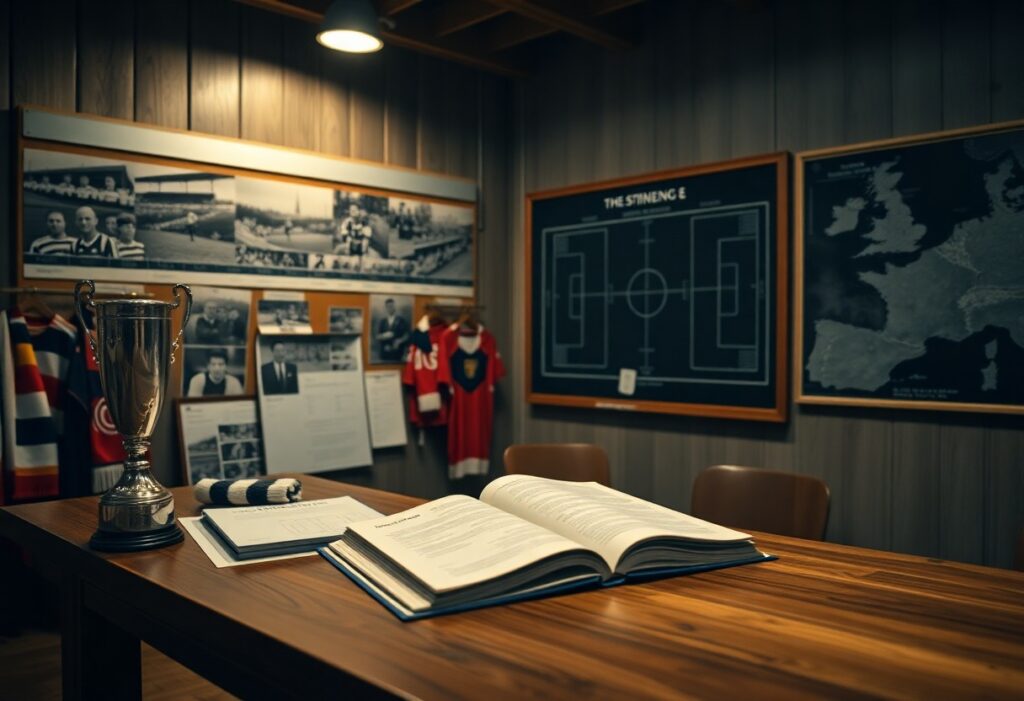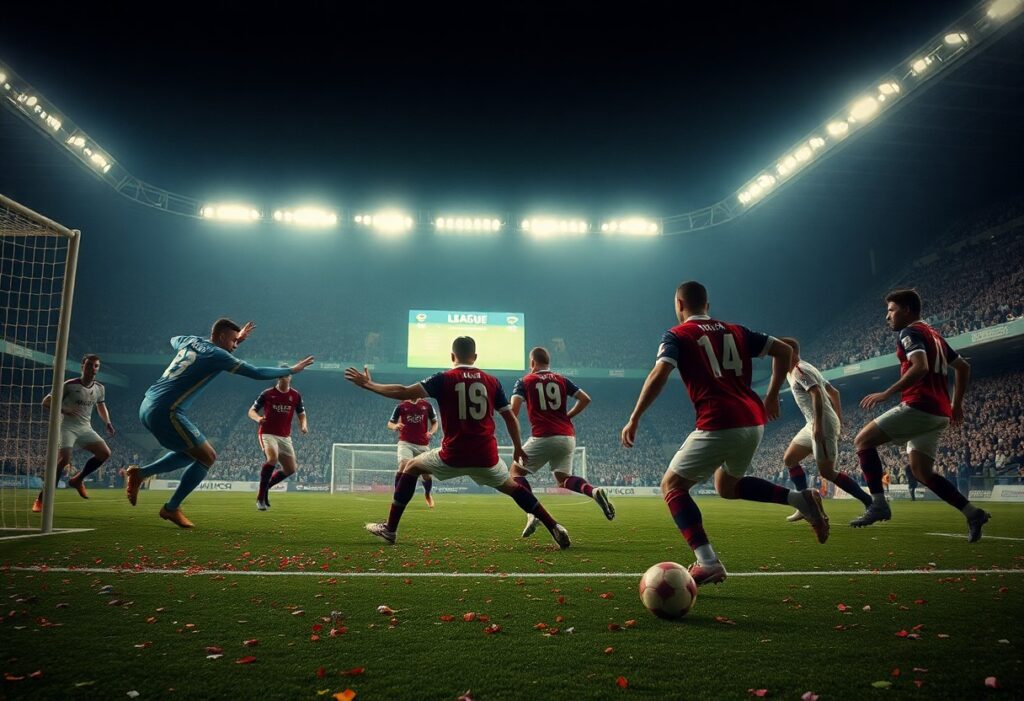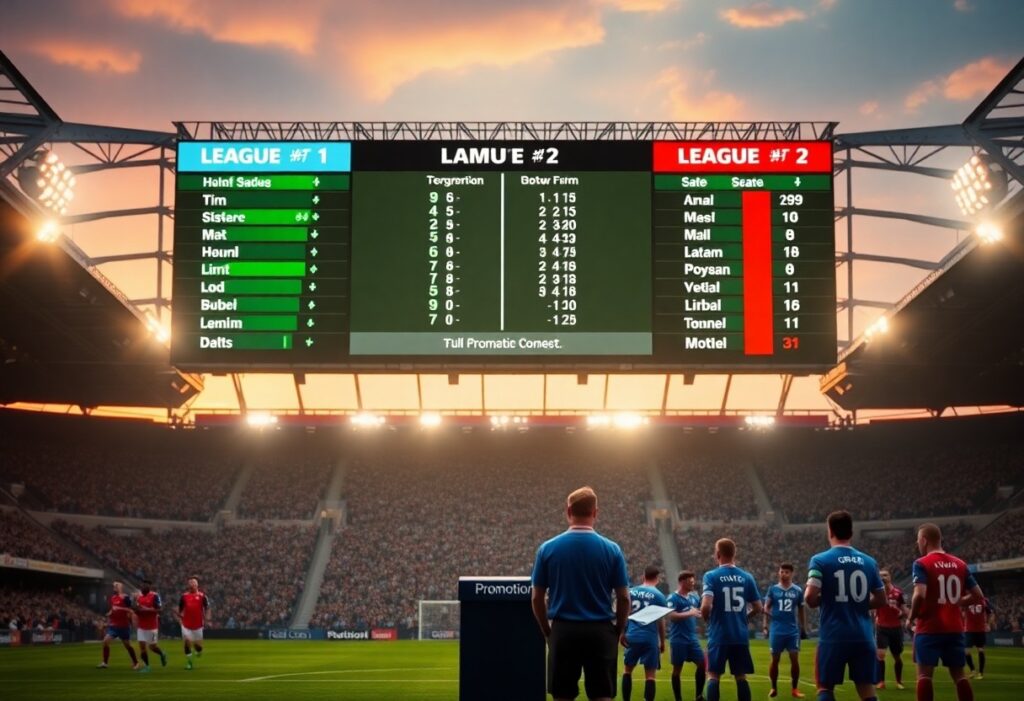Competition at the highest level of football demands exceptional skill, consistency, and mental fortitude, making it extraordinarily rare for players to find the net across every major tournament. When you examine the elite footballers who have achieved this remarkable feat, you’ll discover that only a select few legends have managed to score in the World Cup, continental championships, Champions League, and domestic competitions throughout their careers. This exclusive achievement separates true global superstars from merely talented players, as it requires not only individual brilliance but also the opportunity to compete at every level while maintaining peak performance across different stages of your career.
The Pinnacle of Scoring: Major Tournaments Defined
When you examine football’s elite competitions, four distinct categories emerge as the ultimate proving grounds for goal-scoring greatness. The World Cup stands as the global pinnacle, while the UEFA Champions League represents European club supremacy. Continental championships like the Copa América and European Championship showcase regional excellence, and prestigious club tournaments such as the UEFA Cup and Copa Libertadores complete the quartet. Scoring across all four categories requires adapting to different pressures, playing styles, and tactical approaches that separate true legends from merely talented players.
World Cup: The Ultimate Stage
Your World Cup goals carry more weight than any other strikes in football history. Only 32 nations qualify every four years, making each tournament appearance precious and rare. The pressure intensifies with every match as elimination looms, and the world’s best defenders study your every move. Players like Pelé, who scored in four World Cups, and Miroslav Klose, with his record 16 goals across four tournaments, demonstrate how sustained excellence over multiple cycles defines legendary status on football’s grandest stage.
UEFA Champions League: European Glory
European nights test your ability to perform against the continent’s most tactically sophisticated teams week after week. The Champions League’s knockout format demands clutch performances when elimination threatens, while the group stage requires consistency across diverse playing styles. Cristiano Ronaldo’s 140 Champions League goals exemplify the sustained excellence needed to dominate Europe’s premier competition season after season.
The Champions League’s evolution from the European Cup in 1992 transformed the competition into a grueling test of endurance and adaptability. You face Premier League physicality one week, then Serie A’s tactical discipline the next. Away goals rules and penalty shootouts add layers of complexity that separate this tournament from domestic leagues. The competition’s expansion to include multiple teams per country means you encounter varied playing philosophies even within the same nation, making tactical flexibility imperative for consistent goal-scoring success.
Continental Championships: A Different Arena
Continental tournaments like the European Championship and Copa América present unique challenges that differ markedly from World Cup pressures. Regional rivalries intensify every match, while familiar opponents force you to constantly evolve your approach. These competitions occur every four years (or irregularly like Copa América), creating limited opportunities to establish your legacy. Michel Platini’s nine goals in Euro 1984 remain unmatched, showcasing how peak performance in these tournaments can define entire careers.
The tactical landscape of continental championships reflects regional football philosophies more purely than global competitions. European Championships emphasize technical precision and tactical discipline, while Copa América showcases South American flair and physicality. Weather conditions, altitude, and playing surfaces vary dramatically across host nations, demanding physical and mental adaptation. Your success depends on understanding these regional nuances – the patient build-up play favored in Europe versus the direct, passionate approach common in South American football creates entirely different scoring opportunities.
Club-Level Tournaments: Beyond Borders
Secondary European competitions and continental club tournaments like the Copa Libertadores demand respect for their unique pressures and playing conditions. The UEFA Cup’s diverse participant pool means facing teams from vastly different leagues and tactical backgrounds. South America’s Copa Libertadores presents extreme altitude changes, hostile atmospheres, and physical playing styles that test your adaptability. These tournaments often feature your breakthrough moments before reaching Champions League or World Cup stages.
Club tournaments beyond the Champions League serve as proving grounds where emerging talents announce themselves and established stars maintain their edge. The Europa League’s Thursday-Sunday schedule tests squad depth and rotation capabilities, while Copa Libertadores matches at 3,500-meter altitude in La Paz challenge your physical preparation. Travel demands across South America’s vast distances create fatigue factors absent in European competitions. Your ability to score consistently in these environments demonstrates the versatility needed for true global recognition, as many future World Cup stars first shine in these demanding continental club competitions.
Legends Who Shone Bright: Iconic Players in Focus
When you examine the pantheon of football greatness, certain names transcend mere statistics to become symbols of excellence across every major competition. These legendary figures didn’t just participate in tournaments—they dominated them with consistent goal-scoring prowess that defined entire eras. Their ability to find the net in World Cups, continental championships, domestic leagues, and international club competitions sets them apart from their contemporaries and establishes their legacy as true icons of the beautiful game.
Cristiano Ronaldo: The Goal Machine
Ronaldo’s unprecedented scoring record across competitions speaks volumes about his relentless pursuit of excellence. You’ll find his name etched in history as the all-time leading scorer in Champions League history with 140 goals, while also holding records in European Championships and international football. His ability to adapt his playing style from Manchester United’s winger to Real Madrid’s clinical finisher, then to Juventus’s versatile forward, demonstrates how he consistently delivered goals regardless of tactical systems or league demands.
Lionel Messi: The Magician’s Touch
Messi’s goal-scoring artistry transcends conventional metrics, combining technical brilliance with an innate understanding of space and timing. His record-breaking 91 goals in a calendar year (2012) showcased his ability to find the net across La Liga, Champions League, Copa del Rey, and international fixtures. You witness pure footballing poetry when Messi weaves through defenses, transforming seemingly impossible angles into scoring opportunities that have graced every major competition he’s entered.
Beyond the raw numbers, Messi’s goal-scoring evolution tells a fascinating story of adaptation and growth. His early years saw him operating primarily as a right-winger, cutting inside to unleash his famous left foot, but tactical shifts under different Barcelona coaches transformed him into a false nine, then a deeper playmaker who still maintained his lethal finishing ability. You can trace his development through his World Cup performances—from the disappointment of 2014’s final loss to the triumph of 2022 in Qatar, where his seven goals and three assists finally completed his collection of major honors. His Champions League exploits include memorable hat-tricks against Real Madrid and Manchester City, while his Copa América breakthrough in 2021 ended a 28-year international trophy drought for Argentina, proving that his magic works across all formats and pressure situations.
Pele: The King of Football
Pele’s scoring legacy spans an era when football was transitioning into its modern form, yet his goal tally remains staggering by any measure. You’ll discover that his official count of over 1,000 career goals includes strikes across World Cups, Copa Libertadores, Brazilian championships, and international friendlies. His three World Cup victories (1958, 1962, 1970) featured goals that became part of football folklore, establishing him as the benchmark for complete attacking excellence across all major competitions.
The Brazilian’s impact extended far beyond mere goal tallies, as he revolutionized how forwards approached different competitions and opponents. During his Santos years, Pele scored in virtually every type of match imaginable—from local São Paulo state championships to prestigious international club tournaments, including the Copa Libertadores where his performances helped establish South American club football’s global reputation. You can appreciate his versatility through his World Cup goals: the teenage prodigy scoring six goals in Sweden 1958, the injured star of Chile 1962 who still contributed crucial goals before his tournament-ending injury, and the complete footballer of Mexico 1970 whose four goals included the iconic save-and-assist against Uruguay and the thunderous header in the final against Italy. His ability to score spectacular goals in high-pressure situations, whether facing European club sides during Santos’s global tours or representing Brazil in World Cup finals, demonstrated an unmatched capacity to rise to any occasion across every level of competition.
Diego Maradona: The Enigmatic Genius
Maradona’s goal-scoring brilliance emerged in moments of pure inspiration that defined entire tournaments and competitions. His 1986 World Cup campaign featured five goals, including the controversial “Hand of God” and the sublime solo effort against England that
The Statistical Breakdown: Goals Across Competitions
You’ll discover fascinating patterns when examining the numerical achievements of these elite scorers across football’s premier tournaments. The data reveals not just impressive goal tallies, but also the consistency required to find the net in vastly different competitive environments. Cristiano Ronaldo leads with 140+ goals across major competitions, while Lionel Messi follows closely with 130+ strikes. These figures represent decades of sustained excellence at the highest level, showcasing their ability to adapt their scoring prowess from domestic leagues to international stages.
Total Goals by Player
Your understanding of these players’ greatness becomes clearer when you see their cumulative scoring records. Ronaldo’s 140+ goals span across Champions League, European Championships, World Cup, and domestic competitions, demonstrating remarkable longevity. Messi’s 130+ goals showcase similar dominance, with particularly strong showings in Champions League and Copa America. Pelé’s achievements, though from a different era, remain impressive with over 90 goals across major tournaments, while modern players like Benzema and Lewandowski have surpassed 80 goals each in their quest for this exclusive achievement.
| Player | Total Major Competition Goals |
|---|---|
| Cristiano Ronaldo | 140+ |
| Lionel Messi | 130+ |
| Robert Lewandowski | 85+ |
| Karim Benzema | 80+ |
| Pelé | 90+ |
Goals Per Competition: A Comparative Analysis
You’ll notice distinct patterns in how these players distribute their goals across different competitions. Champions League typically accounts for 40-50% of their major competition goals, reflecting the tournament’s extended format and annual occurrence. World Cup contributions vary significantly, with some players managing 15+ goals across multiple tournaments while others achieve the milestone with fewer strikes due to limited appearances.
Your analysis of competition-specific scoring reveals interesting tactical adaptations. Ronaldo’s 140 Champions League goals represent his most prolific competition, followed by his 14 European Championship strikes across five tournaments. Messi’s distribution shows similar Champions League dominance with 129 goals, complemented by his recent World Cup triumph adding crucial goals to his tally. The data demonstrates how different tournament formats favor different playing styles – knockout competitions reward clutch performers, while league formats benefit consistent scorers over extended periods.
| Competition Type | Average Goal Distribution |
|---|---|
| Champions League | 45-50% |
| Domestic League | 25-30% |
| International Tournaments | 15-20% |
| Domestic Cups | 10-15% |
The Evolution of Scoring Trends
You can observe how scoring patterns have shifted dramatically across different football eras. Modern players benefit from expanded tournament formats, with Champions League group stages providing more opportunities compared to the straight knockout European Cup format. Today’s elite scorers also enjoy longer careers, with improved sports science enabling players like Ronaldo and Messi to maintain peak performance well into their late thirties.
Your examination of historical trends reveals that contemporary players score at higher rates per game but across more competitions than their predecessors. The 1970s and 1980s featured fewer international tournaments, making Pelé’s and Maradona’s achievements more remarkable given limited opportunities. Modern football’s congested calendar paradoxically creates more chances for elite players to accumulate goals across major competitions, though the physical demands have intensified. The data shows current players average 0.65-0.
The Impact of Scoring in Every Competition on Legacy
When you examine the careers of football’s greatest legends, scoring across all major competitions becomes the ultimate measuring stick that separates good players from immortal ones. Your ability to find the net in domestic leagues, cup competitions, continental tournaments, and international fixtures demonstrates a rare combination of longevity, adaptability, and clutch performance under varying pressures. Players like Cristiano Ronaldo and Lionel Messi didn’t just accumulate goals—they strategically built their legacies by conquering every available stage, ensuring their names would be etched in football history across multiple generations.
Building a Hall of Fame Career
Your path to football immortality requires more than just scoring prolifically in one competition. Hall of Fame careers are constructed through systematic conquest of every major tournament, creating an unassailable resume that transcends club loyalties and national boundaries. Consider how Karim Benzema’s 2022 Champions League heroics, combined with his consistent domestic scoring and international contributions, elevated him from a very good striker to a Ballon d’Or winner. Scoring in every competition eliminates any arguments about your completeness as a player, providing concrete evidence of your ability to perform when stakes are highest.
Fan Reactions and Marketability
Your commercial value skyrockets when you consistently deliver goals across all competitions, as brands and sponsors gravitate toward players who guarantee global exposure. Fans develop deeper emotional connections with players who score in their domestic league, then replicate that magic in European competitions and international tournaments. This multi-platform success creates a narrative that transcends individual matches, transforming you from a mere athlete into a global entertainment phenomenon that generates revenue streams far beyond your playing contract.
Social media engagement patterns reveal how scoring diversity amplifies your marketability exponentially. Your Champions League goals trend globally, while domestic league strikes maintain weekly relevance, and international tournament goals create lasting viral moments that resurface during major competitions. Marketing executives specifically target players with comprehensive scoring records because they offer year-round promotional opportunities across different competitions, maximizing return on endorsement investments. Your jersey sales increase significantly when fans can associate you with memorable goals in their favorite competitions, whether that’s a last-minute World Cup winner or a title-deciding domestic league strike.
Historical Context and Its Significance
Your achievement of scoring in every major competition places you within an exclusive historical fraternity that spans different football eras. Only a select few players have managed this feat across the modern game’s expanded competition structure, making your accomplishment increasingly rare as tournaments multiply and qualification becomes more challenging. Players from the 1970s faced fewer competitions, while today’s stars must navigate expanded Champions League formats, Nations League fixtures, and additional domestic cup competitions, making contemporary achievements statistically more impressive than their historical counterparts.
Statistical analysis reveals that fewer than 50 players in football history have scored in every major competition available during their era, highlighting the exceptional nature of this achievement. Your success across multiple competitions demonstrates adaptability to different tactical systems, playing surfaces, and competitive pressures that define modern football. Historical context also shows how scoring versatility has become increasingly valuable as football globalized—players who conquered European competitions in the 1980s are now matched against those navigating today’s expanded tournament calendars, creating fascinating cross-generational debates about who truly mastered their respective eras.
To wrap up
As a reminder, you’ve now explored the exclusive group of footballers who achieved the remarkable feat of scoring in every major competition. These players demonstrated exceptional versatility and consistency across different tournaments, from domestic leagues to international championships. When you consider their accomplishments, you’re witnessing true footballing excellence that transcends individual competitions. Their ability to find the net in various high-pressure environments showcases the mental strength and technical skill required to perform at the highest level consistently. You can appreciate how these achievements place them among football’s most complete and reliable goal scorers in history.



